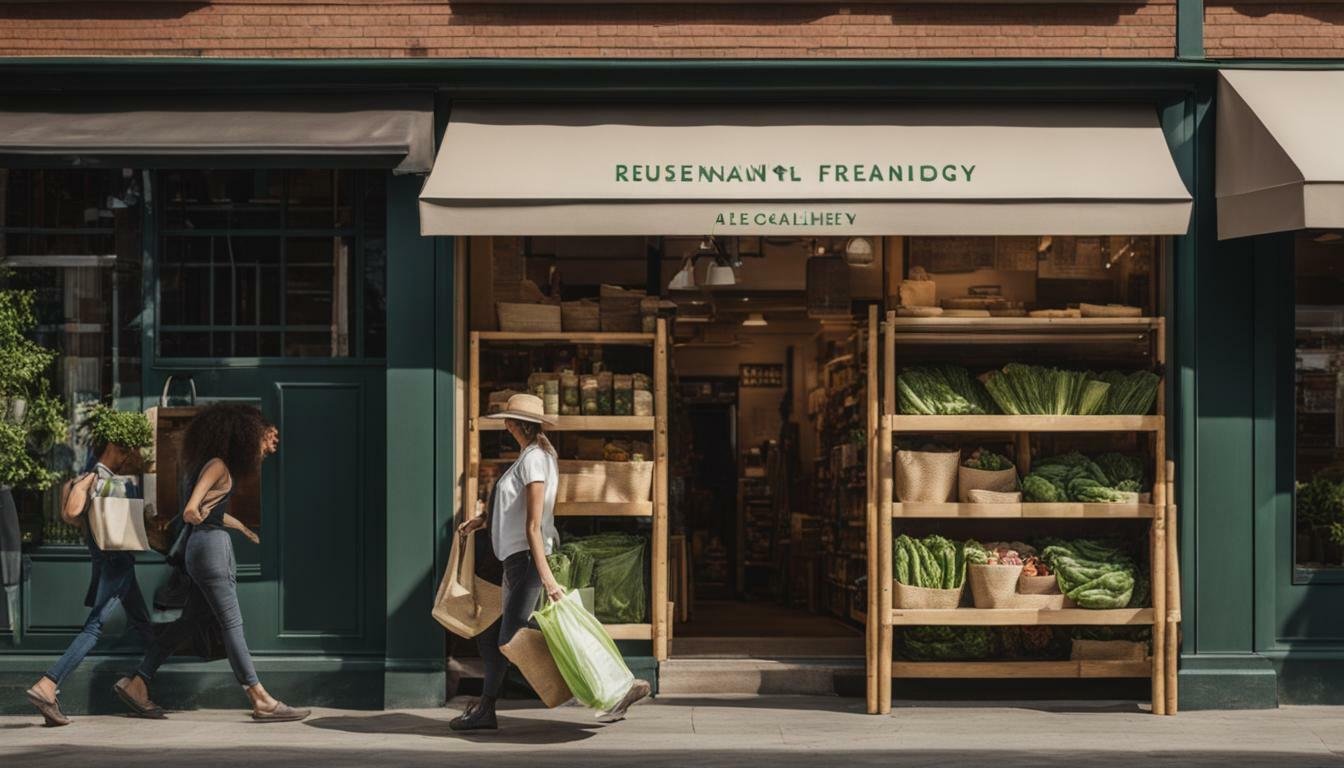Welcome to your ultimate guide to eco friendly shopping! In this section, I’ll walk you through some simple yet effective strategies to help you make greener choices while shopping.
When it comes to shopping, making eco friendly choices can have a big impact on our environment and overall sustainability. By being mindful of the products we buy and the practices we support, we can reduce waste, conserve resources, and support brands that prioritize ethical and sustainable practices.
So, whether you’re a seasoned eco shopper or just getting started on your green journey, this guide is here to help you make informed decisions that align with your values and contribute to a greener future for all.
Key Takeaways:
- Bring your own reusable bags to reduce plastic waste.
- Buy in bulk to minimize packaging waste and support sustainable agriculture.
- Choose products made from sustainable materials like organic cotton or recycled plastic.
- Avoid single-use items such as plastic bags, water bottles, and straws.
- Support local businesses and reduce transportation emissions by purchasing locally.
These are just a few of the many ways you can make greener choices while shopping. By incorporating these strategies into your shopping routine, you can make a positive impact on the environment and contribute to a more sustainable future.
Tips for Eco Friendly Shopping
Let’s dive into some actionable tips that will help you become a pro at eco-friendly shopping! Making sustainable choices while shopping not only benefits the environment but also promotes a healthier and more ethical lifestyle. Here are some tips to guide you:
- Bring your own bag: Use reusable bags to minimize your carbon footprint and reduce plastic waste.
- Buy in bulk: Purchase grains, nuts, and dried fruit in bulk to minimize packaging waste and support sustainable agriculture.
- Choose products produced from sustainable materials: Look for products made from organic cotton, bamboo, hemp, recycled plastic, or recycled wood to reduce your environmental impact.
- Avoid using single-use items: Stay away from disposable items like plastic bags, water bottles, and straws to reduce waste and carbon footprint.
- Purchase locally: Buying from local stores reduces transportation emissions and supports the local economy.
Environmental Certifications
| Certification | Description |
|---|---|
| Forest Stewardship Council (FSC) | An international certification that ensures responsible forest management and sustainable sourcing of wood and paper products. |
| Fair Trade | A certification that guarantees fair wages, safe working conditions, and environmental sustainability in the production of various goods, including clothing, coffee, and chocolate. |
By checking for environmental certifications like the FSC or Fair Trade, you can ensure that the products you buy meet high sustainability standards. These certifications provide peace of mind, knowing that your purchases have been made with the environment and social responsibility in mind.
Additionally, selecting energy-efficient products such as appliances and LED bulbs can significantly reduce electricity consumption and carbon emissions. By reducing food waste, properly storing food, and purchasing organic food locally, you can further minimize your environmental impact and support sustainable farming practices.
Remember, repairing and reusing items instead of replacing them can also conserve resources and reduce waste. By following these tips, you can make more environmentally responsible choices while shopping and contribute to a greener future.

“Every time you spend money, you’re casting a vote for the kind of world you want.” – Anna Lappe
Summary:
When it comes to eco-friendly shopping, there are several practical steps you can take. Bring reusable bags, buy in bulk, choose products made from sustainable materials, avoid single-use items, and purchase locally. Checking for environmental certifications like the Forest Stewardship Council and Fair Trade can also ensure that your purchases align with sustainability standards. Opting for energy-efficient products, reducing food waste, and promoting repair and reuse further contribute to a greener future. Remember, every purchase is an opportunity to make a positive impact on the environment and support ethical practices.
Conclusion
By following these eco friendly shopping tips, you can make a positive impact on the environment and create a more sustainable future for generations to come.
Choosing eco friendly options when shopping is not only beneficial for the planet, but it also allows you to align your values with your purchasing decisions. By bringing your own bag and avoiding single-use items, you can reduce plastic waste and minimize your carbon footprint.
Buying in bulk and selecting products made from sustainable materials like organic cotton or recycled plastic helps reduce packaging waste and supports sustainable agriculture. Purchasing locally not only reduces transportation emissions but also supports the local economy.
Checking for environmental certifications such as the Forest Stewardship Council or Fair Trade ensures that the products you buy meet high sustainability standards. Additionally, opting for energy-efficient appliances and reducing food waste can further contribute to a greener lifestyle.
Remember, repairing and reusing items instead of replacing them can conserve resources and reduce waste. By implementing these eco friendly shopping tips into your everyday life, you can play a part in creating a more sustainable future for our planet.
FAQ
What are some eco-friendly shopping tips?
Some eco-friendly shopping tips include using reusable bags, buying in bulk to minimize packaging waste, choosing products made from sustainable materials, avoiding single-use items, purchasing locally, checking for environmental certifications, selecting energy-efficient products, reducing food waste, and promoting repair and reuse.
Why is using reusable bags important?
Using reusable bags helps minimize your carbon footprint and reduce plastic waste. By bringing your own bag, you can avoid using single-use plastic bags that contribute to environmental pollution.
How does buying in bulk help with sustainability?
Purchasing grains, nuts, and dried fruit in bulk helps minimize packaging waste. By buying in larger quantities, you reduce the need for individual packaging, which can reduce overall waste production. Bulk purchases also support sustainable agriculture practices.
What are some sustainable materials to look for when shopping?
When shopping, look for products made from organic cotton, bamboo, hemp, recycled plastic, or recycled wood. By choosing products made from sustainable materials, you can reduce your environmental impact.
Why should I avoid using single-use items?
Single-use items like plastic bags, water bottles, and straws contribute to waste and have a negative impact on the environment. By avoiding these items and opting for reusable alternatives, you can reduce waste and your carbon footprint.
Why is buying locally important for sustainability?
Buying from local stores reduces transportation emissions, as products don’t need to be transported over long distances. Additionally, supporting local businesses helps boost the local economy.
What should I look for in terms of environmental certifications?
Look for certifications like the Forest Stewardship Council or Fair Trade to ensure that the products you buy meet high sustainability standards. These certifications indicate that the products were produced in an environmentally and socially responsible manner.
How can energy-efficient products be beneficial?
Opting for energy-efficient appliances and LED bulbs can help reduce electricity consumption and carbon emissions. These products are designed to use less energy while providing the same level of functionality.
How can I reduce food waste while shopping?
To reduce food waste, only buy what you need and properly store food to keep it fresh for longer. Additionally, purchasing organic food locally can help support sustainable farming practices and reduce waste in the food supply chain.
Why is repairing and reusing items important?
Repairing and reusing items instead of replacing them helps conserve resources and reduce waste. By extending the lifespan of products, you can reduce your overall consumption and minimize environmental impact.





